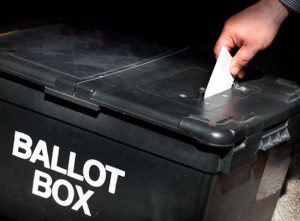
At the height of the exchange, the subject came up. After we had addressed the economy, following our discussion on the environment and the state of farming, and even in the wake of a discussion of veterans’ compensation, a member of the audience rose to address what was at the heart of the evening’s discussion.
“What’s the cost of politics?” he asked. Tuesday night’s debate, among the six candidates contesting in the by-election for the Nov. 26 vote in our riding of Durham, as you’ll see reported on elsewhere in the Cosmos, drew a sizeable audience on an otherwise damp and dreary night. During the evening, nominees from six national parties – Christian Heritage, Conservative, Green, Liberal, New Democratic and (a new one) the Online Party of Canada – made introductory statements.
Then, the five men and one woman debated some of the issues for about half an hour. But for the bulk of the time, we invited the audience to microphones to pose questions.
“I want to know how each of you views the cost of politics,” the questioner emphasized.
I was in my usual spot – moderating the discussion so that all candidates might get equal time and stay (more or less) on topic – through the evening’s two-and-a-half-hour debate. If memory serves, the question was sparked by the man’s disappointment that Canada’s Members of Parliament have, in his words, “lavish expense accounts and luxurious pensions.” His question also revealed the elephant in the room: the fact that, among other reasons, the former MP representing this constituency, Bev Oda, had resigned the seat over allegations she’d spent exorbitantly on transportation and food while abroad on the nation’s business.
I would suggest that the entire evening was about the cost of politics. Whether it’s time, money, energy, dedication or service rendered, the candidates addressed the question all night. What’s more, in their comments and positions, they all illustrated they have paid that price willingly.
When NDP candidate Larry O’Connor spoke about the need to preserve manufacturing jobs, he noted that when he was young the automobile building sector in Oshawa had supported 30,000 jobs at General Motors. “Today it’s fewer than 10,000,” he said. It seemed, to O’Connor, that the days of a booming Ontario job market were now history. And while he would campaign to find and maintain quality jobs in manufacturing, he realized that global policies and politics had taken those jobs away and altered many families’ incomes and lifestyles permanently.
For CHP candidate, Andrew Moriarity, the cost of his politics has been very straightforward. He has felt frustrated by Parliament’s refusal to debate his (and his party’s central) belief in the right to life of every unborn fetus.
There was a particular moment when the Green Party candidate, Virginia Ervin, took criticism for her position against genetically modified foods and against feeding animal by-products to herbivores. Someone later accused her of never having been a farmer.“My father was a farmer,” she said in response and then quietly deflected the accusation. “I grew up on a farm… did chores, raised livestock.” Ervin seemed offended by the accusation. It seemed the cost of her politics was that her farm roots had been overlooked.
Perhaps the candidate sensing the greatest cost of politics was Michael Nicula. He continuously lamented the “death of democracy,” that nowhere was there evidence the major parties were directly responsible to their constituents. Again and again, he entreated the citizens of Durham riding to take a stand on issues by registering their specific preferences on the party’s website. As irregular as it seemed to many, Nicula wanted Durham residents to take back democracy via their online voting on jobs, taxes, budgets and social policy.
Liberal party candidate Grant Humes focused on many of the same issues. But he seemed most emphatic about what he viewed as the “injustice being served on our veterans.” He strongly protested the way Veterans Affairs has dealt with veterans in regard to pensions, health care and even burial. For Humes, the cost of politics has been the sting added to lack of funding and social service support when as many as 10 per cent of retuning Afghanistan veterans require some form of psychological and sociological assistance.
And since Conservative party candidate Erin O’Toole himself served a dozen years in the military, he too expressed concern for his comrades-in-arms who’ve returned to unsatisfactory consideration and/or compensation. I noticed several times, unlike other candidates this night, when O’Toole felt he wasn’t sufficiently informed on a subject, he said so. Sometimes the cost of politics is when honesty makes a candidate appear uninformed. He promised he’d find out, even if that wasn’t soon enough for some in the audience.
For political candidates, I think the cost of politics isn’t so much in philosophical stances or even in the planks of their parties’ platforms. Sometimes the price is as invisible as the 24/7 approach each of them takes to running in the first place.